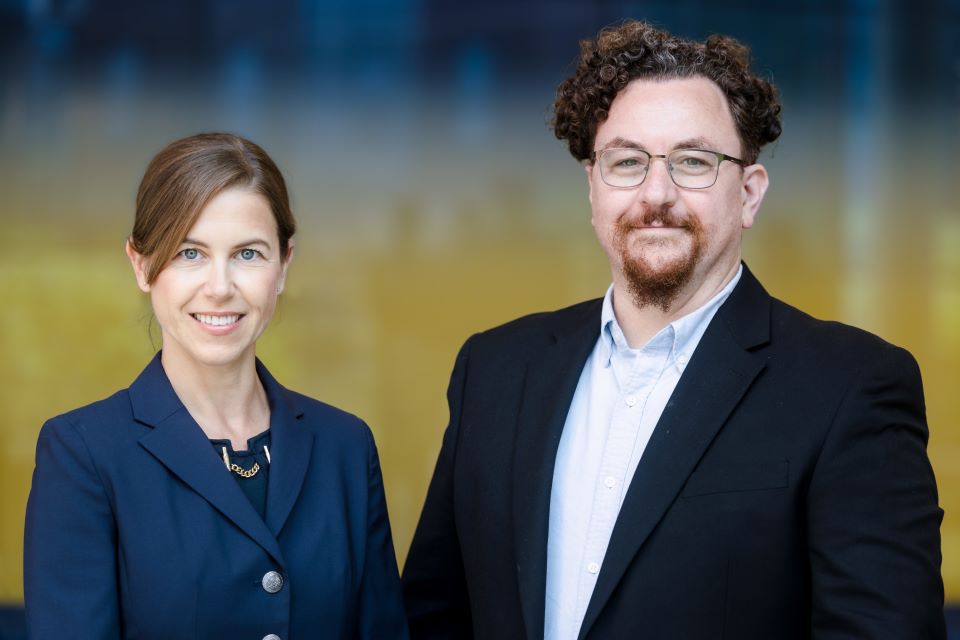Innovative Software Lab at Saint Louis University Receives Second Round of Funding from Alfred P. Sloan Foundation
A grant from the Foundation established Open Source with SLU in 2022
ST. LOUIS – Open Source with SLU (OSS), a pioneering software engineering lab at Saint Louis University, has received a $654,610 grant from the Alfred P. Sloan Foundation to continue advancing open scholarship and developing open-source software.

Kate Holdener, Ph.D., assistant professor of computer science at SLU, and Daniel Shown, OSS Program Director, run Open Source with SLU. Photo by Sarah Conroy.
OSS was established in 2022 when the Sloan Foundation awarded Kate Holdener, Ph.D., assistant professor of computer science at SLU, a grant to aid in the lab's founding. The current funding will aid Holdener and Daniel Shown, OSS Program Director, in their goal to have OSS achieve financial independence by the 2026-27 academic year.
“We are very thankful to the Sloan Foundation for this grant,” Holdener said. “With this new round of funding, we will deepen the roots of Open Source with SLU, and work toward making this a permanent facility within the University.”
The Center engages graduate and undergraduate students in open-source software development, focusing on research software projects that help SLU faculty reach and advance their research goals. Faculty members can submit software requests for graduate students and SLU researchers to prototype and design software solutions.
“Dr. Holdener had an idea, and we tested that idea,” Shown said. “The great news is we have found methods and patterns that work. Now we’re working on bringing these to more partners and making the program a long-term success.”
Undergraduate computer science students enrolled in project-based courses work with OSS as part of their course curriculum, working under the mentorship of graduate students to implement various designs and produce software using industry-standard practices.
“OSS addresses two significant challenges in universities: providing experience-based software engineering education and supporting the development and maintenance of custom research software,” Holdener said.
Shown said OSS is creating a talent and solution pipeline for software development. The team currently includes 20 graduate students and three part-time developers.
OSS has developed several impactful tools for SLU partners in its first two years, including MeltShiny for computational chemistry, Seeing-Is-Believing for language education, and Where's Religion for religious studies research.
Other projects include aiding a volunteer group with a site to track staffing at emergency homeless shelters.
Earlier this year, OSS released its first project to an external partner. Holdener and Shown hope to continue to build collaboration with industry and academic partners.
“Our graduate students are getting real experiences as technical mentors and trusted partners for our clients,” Shown said. “They are ready to be leaders. The program is really about sustaining innovation in both research and industry. We’re providing a pipeline for talent, expertise, and solutions.”
SLU researchers and faculty may request development or updates to open-source software for research endeavors. Questions can be directed to oss@slu.edu.
Alfred P. Sloan Foundation
The Alfred P. Sloan Foundation is a not-for-profit, mission-driven grantmaking institution dedicated to improving the welfare of all through the advancement of scientific knowledge. Established in 1934 by Alfred Pritchard Sloan Jr., then-President and Chief Executive Officer of the General Motors Corporation, the Foundation makes grants in four broad areas: direct support of research in science, technology, engineering, mathematics, and economics; initiatives to increase the quality, equity, diversity, and inclusiveness of scientific institutions and the science workforce; projects to develop or leverage technology to empower research; and efforts to enhance and deepen public engagement with science and scientists.
Saint Louis University
Founded in 1818, Saint Louis University is one of the nation’s oldest and most prestigious Catholic institutions. Rooted in Jesuit values and its pioneering history as the first university west of the Mississippi River, SLU offers more than 15,200 students a rigorous, transformative education of the whole person. At the core of the University’s diverse community of scholars is SLU’s service-focused mission, which challenges and prepares students to make the world a better, more just place.
Latest Newslink
- Kathryn Mitchell Pierce, Ph.D.: 1955-2025An obituary for Kathryn Mitchell Pierce, Ph.D., an associate professor at Saint Louis University's School of Education
- Saint Louis University Student Speaks About Leadership and Disability at Ignatian Family Teach-In for JusticeSaint Louis University senior Grace LoPiccolo shared her personal leadership journey at the 2025 Ignatian Family Teach-In for Justice. The event, held annually in Washington, D.C., is the nation’s largest Catholic social justice advocacy day.
- SLU Research Shows Surge in Alcohol-Related Liver Disease Driving ‘Deaths of Despair’Researchers at Saint Louis University School of Medicine say deaths from alcohol-related liver disease have surged in recent years, and the increase is hitting people without a college degree the hardest. While nearly every demographic group is seeing higher death rates—including those with college degrees—the gap between economically disadvantaged groups and more affluent ones is growing, according to new research.
- Saint Louis University Joins Multi-Disciplinary Research Team to Enhance Stress Resilience in SorghumSaint Louis University is part of a multi-disciplinary team, led by the Donald Danforth Plant Science Center, to deepen the understanding of sorghum, a versatile bioenergy crop, and its response to environmental challenges.The U.S. Department of Energy (DOE) Biological and Environmental Research (BER) program supports the three-year $2.5 million project for Genomics-Enabled Understanding and Advancing Knowledge on Plant Gene Function. Saint Louis University will receive $437,039 for its portion of the study.
- SLU Graduates Celebrated at Midyear CommencementSaint Louis University celebrated its Midyear Commencement on Saturday, Dec. 13, inside Chaifetz Arena. More than 1,900 guests watched as 600-plus SLU students walked across the stage and left as graduates.
- Why Do Raccoons Cross the Road? SLU, St. Louis Zoo Research Shows They Don'tA new study led by researchers from Saint Louis University, the Saint Louis Zoo, and partner organizations set out to understand how raccoons use space in one of the nation's largest urban parks.













